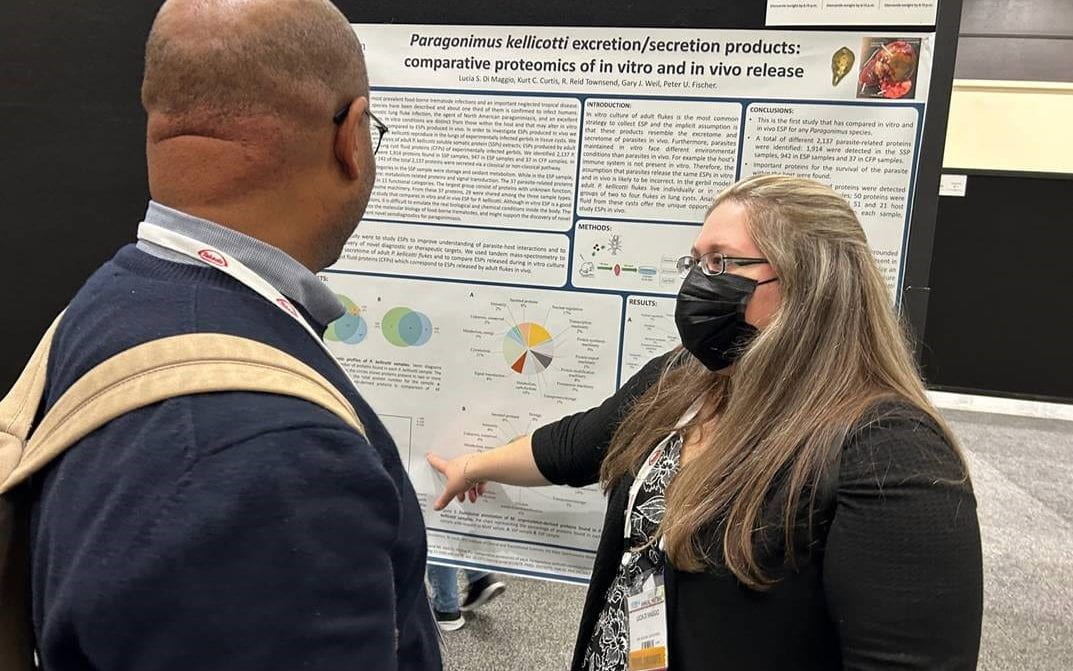As we look towards a new year, we wanted to share some highlights from 2022, a year that saw many new advances and developments in our research on Lymphatic Filariasis (LF) and Onchocerciasis (Oncho).
LF research
Cote d’Ivoire. In late winter, DOLF team members traveled to Côte d’Ivoire for 12-month follow-up visits for patients enrolled in a study of the safety and efficacy of new drug regimens to treat LF. Moxidectin combination treatment (MoxA/MoxDA) compared with ivermectin combination treatments (IA/IDA). Early results suggest superiority of moxidectin combinations for sustained microfilaremia clearance. DOLF investigator Catherine Bjerum from Case Western Reserve University presented these exciting results at the ASTMH meeting in Seattle.
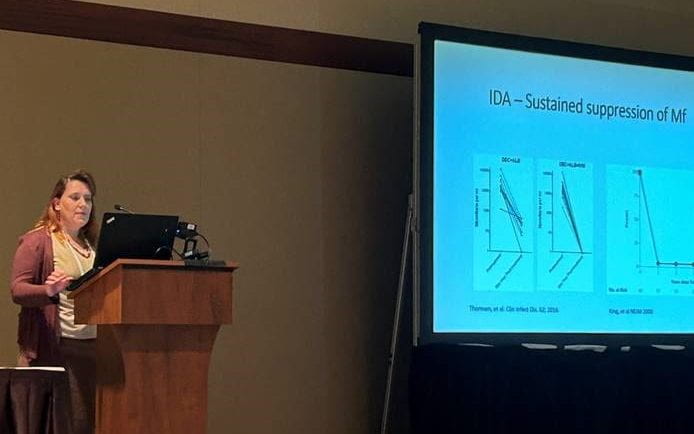
While in country, the DOLF team observed a hydrocele surgery workshop (sponsored by DOLF) to train surgeons to on this procedure. The workshop was organized by Dr. Ben Koudou (CSRS, Cote d’Ivoire) and training was provided by Dr. Adama Guira from Burkina Faso. Approximately 20 men with clinically significant hydroceles that were identified during DOLF surveys had surgical repairs. Local surgeons trained in the workshop will perform this procedure on additional cohorts of patients. The workshop generated a lot of interest, and a local reporter featured our project on the local news.
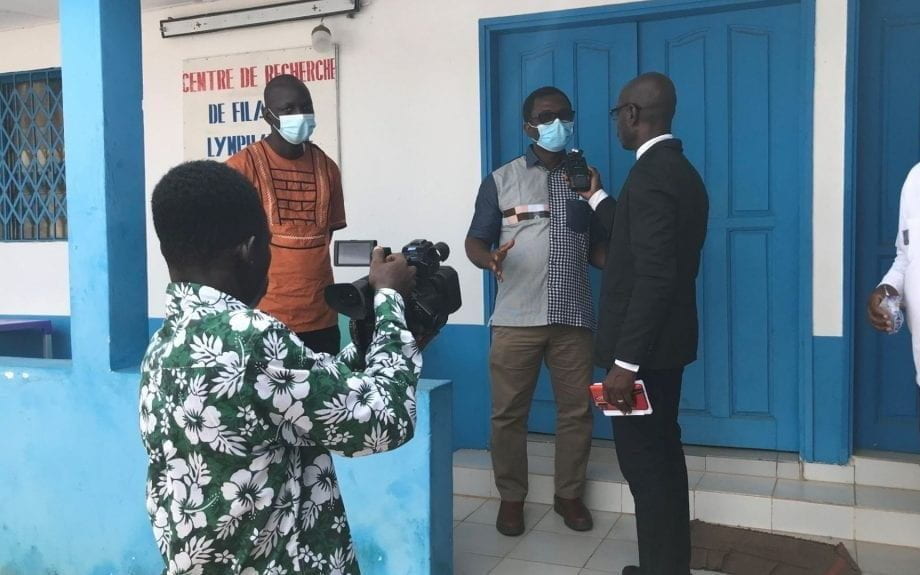
Indonesia. In June, DOLF team members traveled to Indonesia to launch a new study funded by the Bill and Melinda Gates Foundation. This study, conducted in collaboration with the Indonesian Ministry of Health and Dr. Tania Supali’s group at the University of Indonesia, aims to better understand why LF returned to Belitung district after the area had passed TAS-3 (Transmission Assessment Survey) several years ago.
The team will perform surveys to assess the impact of triple drug (IDA) provided by the Ministry of Health in areas with persistent or resurgent LF in the district. The study will also include studies to assess community acceptance of Mass Drug Administration, potential zoonotic reservoirs for the parasite, and mosquito vectors responsible for LF transmission in Belitung.
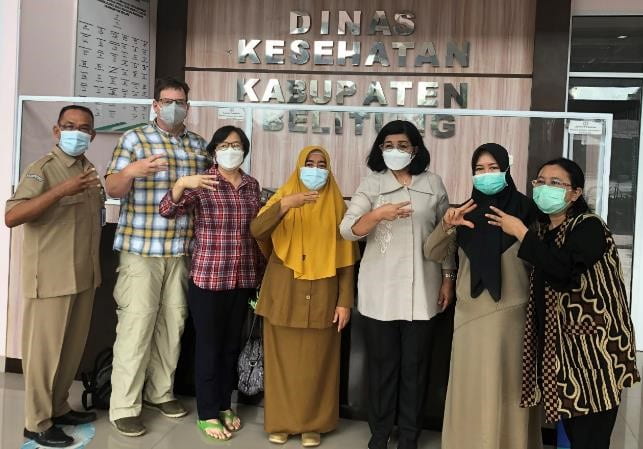
Onchocerciasis research
Liberia. DOLF team members traveled to Liberia to launch a new clinical trial that is being conducted in partnership with Dr. Patrick Kpanyen and his team at the National Public Health Institute in Liberia (NPHIL). Part I of this project will screen and recruit eligible participants for the study and document the impact of ivermectin treatment on microfilariae in the skin and eyes of study participants. Part II of the study (scheduled to start in mid-2023) will examine the safety and efficacy of new treatment regimens that may have macrofilaricidal activity against O. volvulus.
Ghana. The Liberia study is a natural follow-up to our recently completed study in Ghana, “Safety and efficacy of triple drug therapy for individuals infected with Onchocerca volvulus”. Peter Fischer and Nick Opoku presented the latest results from that study at the ASTMH meeting in Seattle. The results suggest that IDA has significant macrofilaricidal activity relative to the widely used two drug regimen ivermectin plus albendazole. The Ghana study represents progress in the long quest for a safe, oral macrofilaricide. Lessons from the Ghana study informed the design of the new Liberia study mentioned above.
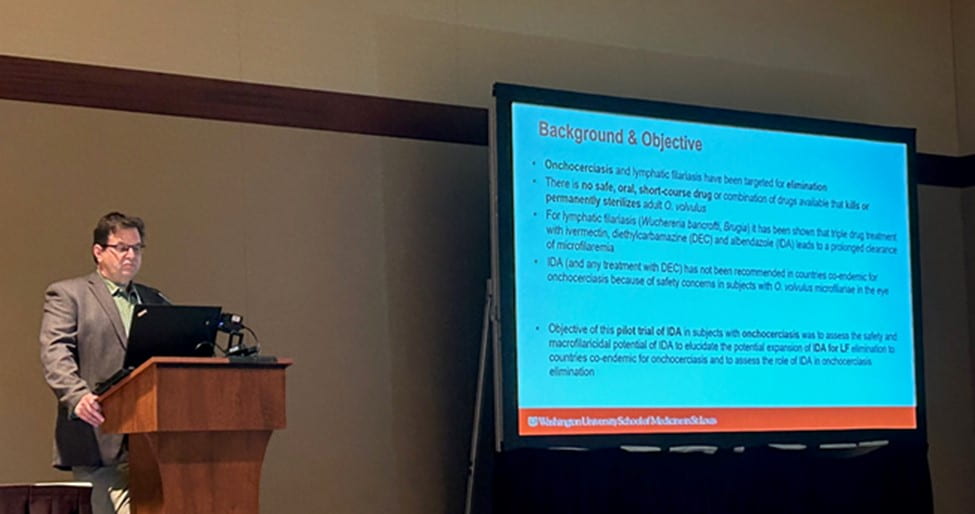
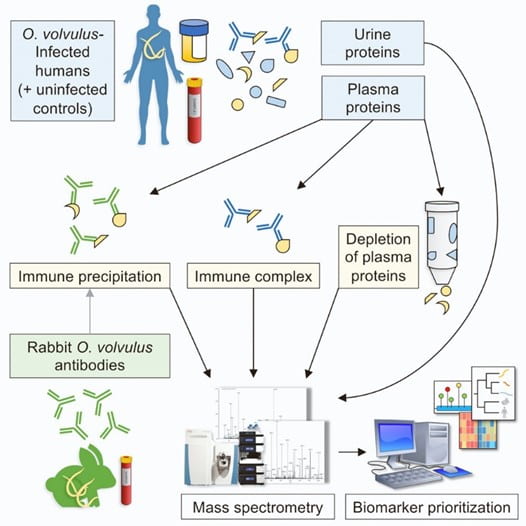
Biomarker research
Dr. Peter Fischer is leading a multidisciplinary team (parasitology, immunology, proteomics, and bioinformatics) in a project on biomarker discovery for Oncho and LF that is also funded by the Gates Foundation. The goal of this work is to identify biomarkers and develop improved diagnostic tests for Oncho and LF. Dr. Bruce Rosa and others have recently published a paper on O. volvulus proteins detected in human serum and urine samples by advanced proteomics methods. Similarly, Dr. Sarah Greene in our group has developed a novel antibody test for LF that is currently undergoing additional validation.
Additional Neglected Tropical Disease (NTD) research
Members of the DOLF team in St. Louis are also involved in other NTD research projects. Research on paragonimiasis, an important food-borne trematode infection continued. Dr. Lucia Di Maggio analyzed excretion/secretion products of the lung fluke Paragonimus kellicotti produced in vitro and produced in lung cyst nodules of infected animals by proteomics. Together with Big Eye Diagnostics, San Diego and a paragonimiasis research group in the Philippines, the team obtained a pilot NIH grant to evaluate a new rapid diagnostic test that is based on a recombinant antigen developed by the group.
Publications
We finished the year with 12 new publications. Some of these were included in a Plos Collection on IDA treatment for LF and a special supplement in the American Journal of Tropical Medicine and Hygiene that featured the DOLF team’s work to demonstrate the safety and efficacy of a single-dose IDA for LF – which ultimately led to a new policy recommendation by the WHO. Here is a full list of our 2022 publications:
- Direct proteomic detection and prioritization of 19 onchocerciasis biomarker candidates in humans
Rosa BA, Curtis K, Erdmann Gilmore P, Martin J, Zhang Q, Sprung R, Weil GJ, Townsend RR, Fischer PU, Mitreva M Molecular and Cellular Proteomics, 2022 Nov 23:100454 - Persistence of onchocerciasis in villages in Enugu and Ogun states in Nigeria following many rounds of mass distribution of ivermectin
Ekpo UF, Eneanya OA, Nwankwo EN, Soneye IY, Weil GJ, Fischer PU, Nwaorgu OC
BMC Infectious Diseases, 2022, Nov 10;22(1):832 - Characterization of a novel microfilarial antigen for diagnosis of Wuchereria bancrofti infections
Greene SE, Fischer K, Choi YJ, Curtis KC, Budge PJ, Mitreva M, King CL, Fischer PU, Weil G
PLoS Neglected Tropical Diseases, 2022, 16:e0010407 - New Research Aims to Optimize Therapy Against Onchocerciasis
Hong AR, Opoku NO, Weil GJ, Kanza EM, Gyasi ME Mo Med. 2022 Jan-Feb;119(1):55-59 - Mass drug administration of ivermectin, diethylcarbamazine, plus albendazole compared with diethylcarbamazine plus albendazole for reduction of lymphatic filariasis endemicity in Papua New Guinea: a cluster-randomised trial
Laman, M, Tavul, L, Karl, S, Kotty, B, Kerry, Z, Kumai, S, Samuel, A, Lorry, L, Timinao, L, Howard, SC, Makita, L, John, L, Bieb, S, Wangi, J, Albert, JM, Payne, M, Weil, GJ, Tisch, DJ, Bjerum, CM, Robinson, LJ, King, CL Lancet Infect Dis. 2022;22:1200-09 - Community-based trial assessing the impact of annual versus semiannual mass drug administration with ivermectin plus albendazole and praziquantel on helminth infections in northwestern Liberia
Eneanya, OA, Gankpala, L, Goss, CW, Momolu, AT, Nyan, ES, Gray, EB, Fischer, K, Curtis, K, Bolay, FK, Weil, GJ, Fischer, PU Acta Tropica. 2022;231:106437 - Safety and efficacy of mass drug administration with a single-dose triple-drug regimen of albendazole + diethylcarbamazine + ivermectin for lymphatic filariasis in Papua New Guinea: An open-label, cluster-randomised trial
Tavul, L, Laman, M, Howard, C, Kotty, B, Samuel, A, Bjerum, C, O’Brian, K, Kumai, S, Amuga, M, Lorry, L, Kerry, Z, Kualawi, M, Karl, S, Makita, L, John, LN, Bieb, S., Wangi, J, Weil, GJ, Goss, CW, Tisch, DJ, Pomat W, King C, Robinson, LJ PLoS NTD. 2022;16(2) - Lessons from Large-Scale Tolerability and Acceptability Studies of Triple Drug Mass Drug Administration Performed to Support Policy Change and Accelerate Elimination of Lymphatic Filariasis
Weil, GJ, Fischer, PU, Krentel, A Am J Trop Med Hyg. 2022;106(5 Suppl):13-17 - Development and Introduction of the Filariasis Test Strip: A New Diagnostic Test for the Global Program to Eliminate Lymphatic Filariasis
Pantelias, A, King, JD, Lammie, P, Weil, GJ Am J Trop Med Hyg. 2022;106(5 Suppl):56-60 - Semiannual treatment of Albendazole alone is efficacious for treatment of lymphatic filariasis: A randomized open-label trial in Cote d’Ivoire
Ouattara AF, Bjerum CM, Aboulaye M, Kouadio O, Marius VK, Andersen B, Lew D, Goss CW, Weil GJ, Koudou BG, King CL Clin Infect Dis. 2022;74(12):2200-8 - Country reports for practical aspects of conducting large-scale community studies of the tolerability of mass drug administration with Ivermectin/Diethylcarbamazine/Albendazole for lymphatic filariasis
Jambulingam P, Subramanian S, Krishnamoorthy K, Supali T, Fischer P, Dubray C, Fayette C, Lemoine JF, Laman M, King C, Samuela J, Hardy M, Weil GJ Am J Trop Med Hyg. 2022;106(5 Suppl):18-25 - A Reevaluation of the Tolerability and Effects of Single-Dose Ivermectin Treatment on Onchocerca volvulus Microfilariae in the Skin and Eyes in Eastern Ghana
Opoku, NO, Gyasi, ME, Doe, F, Lew, D, Hong, AR, Chithenga, S, Fischer, PU, King, CL, Weil, GJ Am J Trop Med Hyg. 2022;106(2):740-745
Growing team
Our team continued to expand as we welcomed three new postdocs this year.
Postdoc Dr. Nikhilesh Joardar is working on biomarker research in Dr. Phil Budge’s laboratory.
Postdoc Dr. Adebiyi Adeniran is a molecular entomologist, epidemiologist, and parasitologist who joins the team from Nigeria where he led the NTD division for SightSavers.
Postdoc Dr. Irina Diekmann from Germany will join our group in January 2023. She brings expertise in parasitology, DNA and metabarcoding and phylogeny.
Also a big congratulations to Postdoc Dr. Obiora Eneanya who left DOLF last July to become an Epidemiologist in the Guinea Worm program at The Carter Center in Atlanta. Obi accomplished a lot during his time in St. Louis and never stopped smiling despite COVID challenges. We miss Obi but wish him all of the best in his new job!
